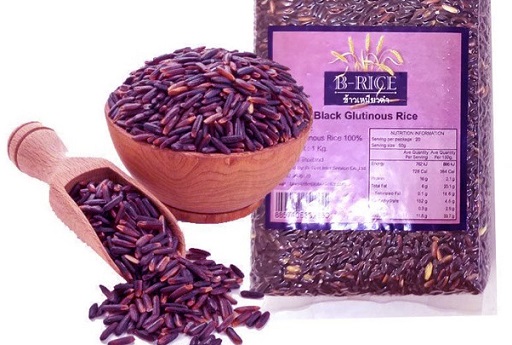Nikhil Prasad Fact checked by:Thailand Medical News Team Dec 02, 2024 4 months, 1 week, 4 days, 8 hours, 4 minutes ago
Thailand Medical: Ancient Grain Unlocks New Possibilities
A recent study conducted in Thailand has unveiled a fascinating health benefit of black sticky rice, a traditional grain known for its high anthocyanin content. Researchers from Khon Kaen University and Bangkok Thonburi University collaborated to explore the potential of black sticky rice as a functional ingredient to combat anxiety, depression, and stress. Their findings suggest that incorporating this ancient grain into everyday meals could have significant mental health benefits.
 Thailand Medical Study Reveals Benefits of Black Sticky Rice for Mental Health
Study Design and Objectives
Thailand Medical Study Reveals Benefits of Black Sticky Rice for Mental Health
Study Design and Objectives
This
Thailand Medical News report delves into the study, which involved 46 adult participants aged between 20 and 60. The participants consumed breakfast meals enriched with anthocyanin from black sticky rice over five days. Two dosages were tested - 2 grams and 4 grams daily - to assess their impact on stress, anxiety, and depression. The meals were designed with a low Dietary Inflammatory Index (DII) and a high Dietary Antioxidant Quality Score (DAQ-S), providing a healthy, balanced diet of 2,000 calories per day.
The research team, which included experts like Pattamaporn Natthee and Jintanaporn Wattanathorn, aimed to evaluate changes in mental well-being and investigate the underlying biological mechanisms. Measurements focused on oxidative stress markers, inflammatory mediators, and neurotransmitter activity.
Key Findings on Mental Health
The results of the study were promising. Participants in both dosage groups reported significant reductions in depression, anxiety, and stress levels, as assessed by the Depression Anxiety Stress Scale-21 (DASS-21). In addition to improved mental health, the researchers noted a decrease in the oxidative stress marker 8-hydroxyguanosine (8-OHdG) and the inflammatory mediator interleukin-6 (IL-6).
These changes are likely due to the antioxidant and anti-inflammatory properties of anthocyanins, which are abundant in black sticky rice.
Interestingly, the study also measured the activity of enzymes like monoamine oxidase (MAO) and acetylcholinesterase (AChE), which are involved in neurotransmitter regulation. While the low-dose group showed a slight increase in MAO activity, which helps regulate stress-related neurotransmitters, no significant changes in AChE activity were observed. This suggests that black sticky rice may primarily affect pathways related to oxidative stress and inflammation rather than direct neurotransmitter metabolism.
Gut Health and Other Benefits
Although anthocyanins are known to influence gut microbiota and support the gut-brain axis, the study found no significant changes in the levels of Lactobacillus and Bifidobacterium in participants' fecal samples. The researchers believe the study's short duration may have limited their ability to detect gut microbiota changes. Longer studies are needed to explore this connection further.
/>
Additionally, blood tests revealed no signs of toxicity or adverse effects, confirming that the anthocyanin-enriched diet is safe for regular consumption. Minor changes in blood protein levels, fasting blood sugar, and other parameters were noted but remained within normal ranges.
Ancient Wisdom Meets Modern Science
Black sticky rice, or Oryza sativa L., has been consumed in northeastern Thailand for centuries. Despite its tough texture and lower popularity compared to white rice, its high anthocyanin content has long been associated with health benefits. This study adds to the growing evidence that traditional foods can play a crucial role in modern health interventions.
The study highlights the potential of black sticky rice as a functional ingredient not only for home cooking but also for the food industry. By incorporating it into daily diets, individuals may improve their mental health while enjoying a nutritious and culturally significant food.
Conclusion and Future Directions
The findings of this groundbreaking study underscore the potential of black sticky rice to enhance mental well-being by reducing oxidative stress and inflammation. While the exact mechanisms require further exploration, the results are encouraging and pave the way for larger, longer-term studies.
Researchers recommend that future studies focus on the long-term effects of black sticky rice on gut microbiota and neurotransmitter pathways. Expanding the sample size and exploring additional dosages could also provide deeper insights into its benefits. For now, this study serves as an excellent example of how traditional foods can be leveraged for modern health challenges.
The study findings were published in the peer-reviewed journal: Food.
https://www.mdpi.com/2304-8158/13/23/3884
For the latest on Functional Foods, keep on logging to Thailand Medical News.
Read Also:
https://www.thailandmedical.news/news/thailand-medical-researchers-discover-black-rice-anthocyanins-may-fight-alzheimer-s-disease
https://www.thailandmedical.news/news/thailand-medical-study-reveals-purple-waxy-corn-tassel-extract-protects-lungs-from-air-pollution-induced-inflammation
